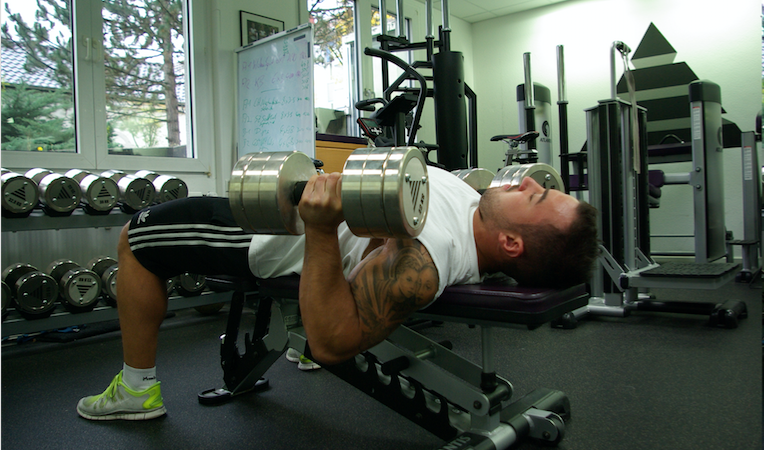The bench press is the emblematic exercise of strength, and one of the most frequently asked questions of anyone who trains will probably be “What do you bench press?”. However, the bench press can't be done with just the barbell - which is the form the question is usually referring to, because the barbell bench press allows for the use of heavier loads. The dumbbell bench press is another exercise variant that we use a lot at YPSI. For good reasons. Considering the following aspects, the dumbbell bench press is the better exercise:
1. The dumbbell bench press recruits more stabilizers. This refers to small muscles, such as those of the rotator cuff, which ensure that the actual movement, in this case pushing the dumbbells up, can be carried out technically as cleanly as possible. Since two dumbbells are more unstable and have more degrees of freedom than one barbell, i.e. you can move outwards at the same time while pressing and your hands don't stay at the same distance from each other the whole time, as with the barbell bench press, bench pressing with dumbbells requires more muscular stabilization . Which is easy to see when a beginner performs the exercise, bringing the dumbbells together in a sinuous line and outward rather than in an arc over the shoulders at shoulder-width apart. Poor muscular coordination and poor stabilizers
2. More stretch. Because of the greater range of motion, the stretch for the chest muscles at the bottom of the dumbbell bench press is much greater than that of a barbell bench press, where the barbell touches the chest before the maximum stretch is reached. Such a stretch is particularly important for the chest muscles, as these are often tight due to our everyday posture and can cause shoulder problems.
3. Compensation of unilateral imbalances - especially ideal for beginners. Typically, someone who has never done unilateral strength training will have a left/right imbalance when it comes to the bench press due to their natural unilateral dominance (eg, being right-handed) or the sport they play. When bench pressing with the barbell, this becomes noticeable when one shoulder lifts off the bench or one arm after the other is completely stretched. These imbalances can be compensated for with the dumbbell bench press, since the stronger side cannot help here, which means that the weaker side dictates the number of repetitions completed - and the entire chain becomes stronger by strengthening the weakest link in the chain.
Based on the three points mentioned above, you can decide whether the bench press with dumbbells is currently the better exercise for you. If you want to know what factors make the barbell bench press a better exercise, read my article, "Why the Barbell Bench is Better Than the Dumbbell Bench," due out next week.
Good luck with the dumbbell bench press!
Image: Ivan Simic ready for neutral-grip dumbbell flat bench press in YPSI.

